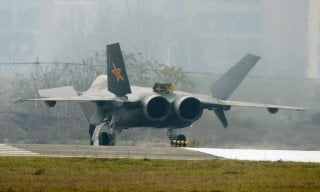China Warns Biden America Pulling Asia "Down a Dangerous Path"
Last Thursday, the Chinese Defense Ministry called for the United States to show "sincerity" in its communications with Beijing, while the ministry also warned that America's Indo-Pacific strategy could "pull the region down a dangerous path."
Last Thursday, the Chinese Defense Ministry called for the United States to show "sincerity" in its communications with Beijing, while the ministry also warned that America's Indo-Pacific strategy could "pull the region down a dangerous path."
At the monthly Chinese Defense Ministry press briefing, spokesperson Senior Colonel Tan Kefei suggested that the Biden administration's Indo-Pacific policy "intentionally hypes up conflict and confrontation," and he accused the United States of encouraging anti-Chinese military alliances and so-called "cliques."
The term is routinely used by Beijing to describe the Quadrilateral Security Dialogue – or Quad – a coalition that includes the United States, Japan, India, and Australia. However, the governments of the four influential powers that span the Indian and Pacific Oceans see the Quad as a central and necessary element in the region to counterbalance China's growing military as well as Beijing's ambitious economic initiatives, which include every continent except North America.
As Newsweek reported, the term "Indo-Pacific" was borrowed from Japanese Prime Minister Shinzo Abe's "Free and Open Indo-Pacific" vision. The term was widely adopted during the Trump administration, and it has essentially replaced "Asia-Pacific."
Tan reportedly told reporters that the Indo-Pacific strategy could instigate "a new Cold War featuring bloc confrontation."
The defense ministry spokesperson also said that China has no strategy that should go against the historical trend of peace and development, and warned that U.S. efforts to intensify its military presence or highlight military competition would only aggravate regional tensions and potentially endanger world peace and stability.
"No strategy should harm the welfare of people in regional countries, or put them in a dangerous situation. Seeking one’s own selfish interests and unilateral absolute security will only do harm to others and lose their support," Tan was quoted as stating.
"We believe that its purpose is to enhance trust, reduce misgivings, manage crises, and prevent conflicts," Tan added. "The US side should not, on the one hand, claim to put up new defence hotlines, while on the other hand keep ramping up military deployments in the Asian Pacific region, frequently conduct close-in reconnaissance on China, and even deliberately initiate dangerous circumstances where aircraft and vessels nearly collide."
Taiwanese Arms Sales
The Chinese Ministry of National Defense also called out the Biden administration's first planned armed sales to Taiwan, and urged the United States to stop any form of official or military exchanges with Taipei. Tan further reaffirmed that Taiwan-related issues should be seen as "internal affairs," and Beijing rejects arms sales or any form of military contact with Taiwan by any country.
The Ministry further denounced the Taiwanese Democratic Progress Party's attempts to seek independence, and suggested that efforts to seek "independence by force" would only drag the island into the abyss of disaster.
Beijing maintains that Taiwan is a breakaway province that will be returned to mainland rule, by force if necessary.
Quad Members Singled Out
It wasn't just the United States that found itself in the crosshairs of Tan last week, and the spokesperson also took direct aim at a close U.S. ally and Quad partner.
"Recently, the Australian side has taken a series of provocative actions, and some people have even incited confrontation and exaggerated the threat of war on Taiwan-related issues," added Tan. "Such actions are incredibly irresponsible."
Peter Suciu is a Michigan-based writer who has contributed to more than four dozen magazines, newspapers and websites. He regularly writes about military small arms, and is the author of several books on military headgear including A Gallery of Military Headdress, which is available on Amazon.com.

